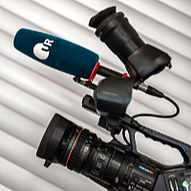Think Space Ukraine (TSU)
German Academic Exchange Service (DAAD) funds Center for Interdisciplinary Ukrainian Studies at the University of Regensburg
28. Februar 2028
The establishment of a new Center - Think Space Ukraine (TSU) or Denkraum Ukraine (DU) – aims to consolidate and advance Regensburg’s diverse expertise on Ukraine's culture, economy, politics, and law. The German Academic Exchange Service (DAAD) has pledged substantial support, injecting about 2.5 million euros from April 2024 to March 2028. This underscores the commitment to fostering the expansion of the numerous connections and collaborations with Ukrainian scholars that are already in place at the University of Regensburg (UR) in the realms of research, teaching, and knowledge transfer.
Professor Dr. Guido Hausmann, Head of the History Department at the IOS and Professor of the History of Eastern and Southeastern Europe with a focus on Russia / Soviet Union and Ukraine at the UR, explains, “At TSU, we can leverage the well-established and diverse inter- and transdisciplinary scholarly activities on Ukraine at the University and the closely associated Leibniz Institute for East and Southeast European Studies (IOS)."
University President Professor Dr. Udo Hebel welcomes the new Center, emphasizing that “it will empower the University, alongside its collaborative partners, to seamlessly integrate activities in research, teaching, and knowledge transfer related to Ukraine. These activities, with a focus on European and global interdependencies, will now coalesce into a more cohesive interdisciplinary framework. The establishment of this institutional structure for research on and with Ukraine is expected to generate sustainable impacts at regional, national, and international levels and to further strengthen our expertise in area studies."

Regensburg citizens rallying against the war in Ukraine. Photo: Julia Dragan © University of Regensburg
The new Center will cluster individual, disciplinary expertise in interdisciplinary fields of research, teaching and outreach. The researchers involved will concentrate on four key topic areas addressing the challenges that Ukraine has been facing in its past and present, considering them in their broader contexts. The Think Space aims at a discursive, relational and action-oriented approach to Ukraine-related research in culture, economics, politics and law in (trans)regional and global contexts.
The topic areas build on the existing research expertise in Regensburg and are titled (1) Language and Cultural Heritage, led by historian Guido Hausmann and literary scholar Mirja Lecke, (2) War, Peace and the Postwar Order of Ukraine, coordinated by political scientist Cindy Wittke and legal scholar Herbert Küpper, (3) Flight, Migration and Value Transfer, led by the historians Katrin Boeckh and Ulf Brunnbauer, and (4) Regional Diversity in Ukraine: Industrial and Border Regions in Comparison, coordinated by literary scholar Oleksandr Zabirko and economist Thomas Steger. The plan is to include further disciplinary expertise from theology or social anthropology as necessary.
TSU is conceived as an open space with interconnections and networks. It embraces digital and face-to-face communication, generating synergies between (visiting) scholars and fellows (from students to doctoral candidates, postdocs to established academics) and existing academic structures: the Graduate School for East and Southeast European Studies, the Department for Interdisciplinary and Multiscalar Area Studies (DIMAS), the Center for Commemorative Culture established in 2022 with the Flossenbürg Concentration Camp Memorial, the Leibniz Institute for East and Southeast European Studies (IOS) and its associated Leibniz ScienceCampus “Europe and America in the Modern World”, as well as the Institute for Eastern European Law.
The scholars and institutions cooperate closely with the Canadian Institute of Ukrainian Studies (CIUS) in Edmonton, Canada, the Taras Shevchenko National University of Kyiv, the Ukrainian Catholic University in Lviv and other regional and international partners.
In the global world of the 21st century, Regensburg is thus building on its role that emerged a thousand years ago as a central location in wide-ranging networks that integrate Ukraine. The city, with its UNESCO World Heritage Old Town, looks back at a long tradition of contacts with Ukraine that began with medieval commercial routes to Kyiv, and later ones leading along the Danube to Odesa, a city also inscribed in the UNESCO World Heritage List since 2022. These contacts multiplied with the upheavals of World-War II, with Regensburg the location of the largest Bavarian "Ukrainian camp" for Displaced Persons and a Ukrainian Scientific Institute founded at the end of the 1940s.
Each of these institutions forms part of a specific urban heritage forming the foundation for developing the TSU’s network with Ukrainian academics and with institutions around the world. Additionally, the Center will benefit from the city of Regensburg's twinning with Odesa and the wide-ranging interest in Ukraine in the city's society and beyond.
Information/Contact
TSU Contact Person: Professor Dr. Guido Hausmann, guido.hausmann@ur.de
DAAD Press Release 28 February 2024
UR Research „Dynamics in the Global World“




